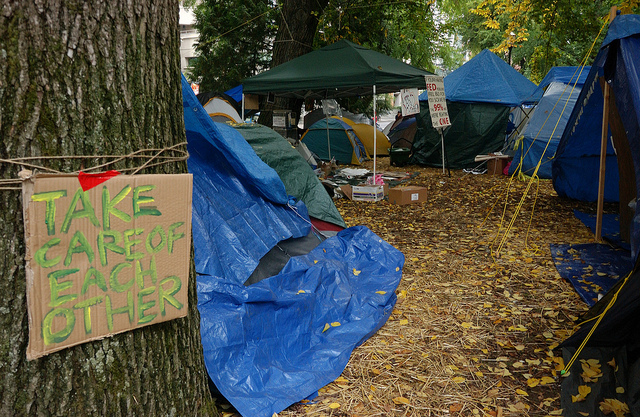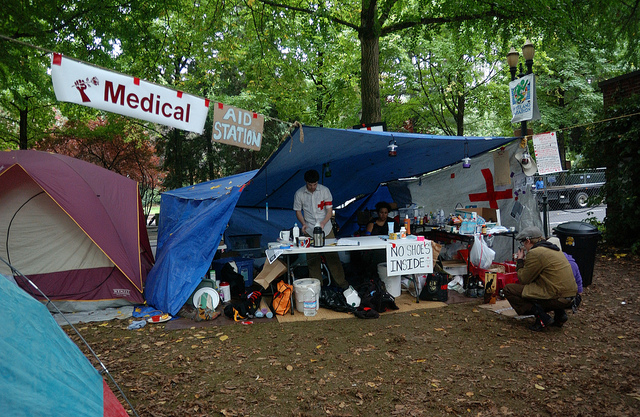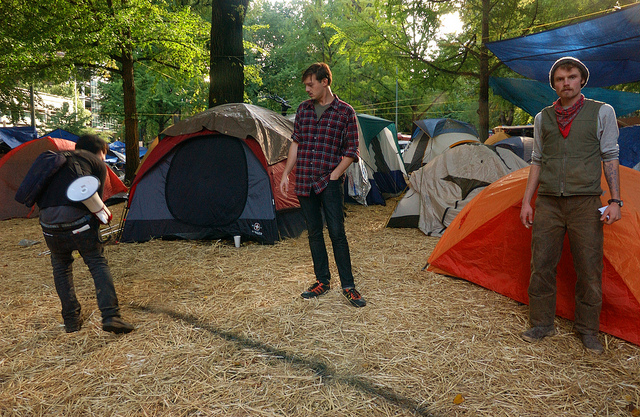by Christina Schüll
It was the night of November 14th, and there was a spontaneous late-night march in downtown Portland. Several Occupy camps were evicted by authorities that night, including Occupy Wall Street, Occupy Oakland, and Occupy Zürich.
Around 10:30, I was leaving the area around Pioneer Square and noticed some folks had their belongings with them and were huddled or sitting together. Based on people carrying more than a purse or backpack, I believed the individuals were homeless. It was very cold out — my fingers were getting pretty icy. I was about to go home and had a strike of compassion in my heart realizing that some of the people may not have a warm cozy home or bed to go to tonight. I saw a group of nine bike police officers standing and talking outside Nordstrom’s and thought that I could ask the police officers if they had information regarding shelters and resources for those who did not have a place to sleep tonight. I had heard Mayor Sam Adams at the afternoon’s press release say that people were talked to the preceding Saturday night regarding housing and given resources.
I approached the officers. Most of them were engaged and talking amongst themselves, two were sitting on the ground sharing something on their smartphones, and two officers, Officer Livingston and Officer Lax, were standing to the side watching the events on Pioneer Square. I introduced myself and asked Officers Livingston and Lax if they knew anything about resources for people who did not have a place to sleep and people facing homelessness and they were very kind and polite to me. Officer Livingston said the best thing to do was contact Central Precinct. He gave me the phone number (503-823-0097). I said thank you, and I left their side. I called Central Precinct, and spoke with Gary who did not give his last name (I did not ask).
Gary mentioned that individuals were given the Rose City Resource Guide, which could reached by calling 211. I called 211 and got a message machine that said they were closed. Hours of operation were 8 am-6 pm, and if it was an emergency, I could call 911 or “if you are experiencing a mental health crisis, call 503-988-4888.” I called Gary at Central Precinct back. I mentioned I had access to the internet and he said I could check the Rose City Resource website. I checked the website, which listed many of their partners on the homepage. I then clicked on the link on the right side which was titled “hotlines.” The hotline list included phone numbers and descriptions of local social service agencies and providers.
I first called the Housing Authority of Downtown Portland listed at 503-288-5750. The phone number was invalid–a voice told me that my call could not be completed. Then, I called the Multnomah County Health Department at 503-988-3816. A message machine picked up and said the office was closed for the day. Next, I called the Raphael House of Portland at 503-222-6222 for information. The woman who picked up explained that Raphael House is a shelter for women escaping domestic violence. The specific requirements for the Raphael House were difficult to distinguish on the Rose City Resource Guide website–I thought it was a general shelter for anyone before calling. The woman I spoke with suggested I call the Women’s Crisis Line at 503-235-5333.
I called the Women’s Crisis Line and spoke with a woman name Natalie. She listened to me and gave me the inside scoop about shelters around Portland. She mentioned that there was only one shelter in town, The Family Winter Shelter, that was taking people in for the night. She also mentioned that The Family Winter Shelter only took in pregnant women and families. I had noticed children and families at the General Assembly at Pioneer Square that night so I asked how they defined a “family” and she described as “must have kids.” She also mentioned that the Women’s Winter Shelter at the YWCA would be opening tomorrow evening. She gave me the phone numbers and addresses of each organization and explained how shelters in Portland work–someone who is interested in staying a night has to call to reserve a spot and shelters open around 7 or 7:30 PM for folks to stay the night.
I asked Natalie about Bud Clark Commons, and she responded that Bud Clark Commons has a long wait list, probably about three months. She mentioned that Bud Clark Commons might have some day services, and explained that they serve men and women. We then spoke a bit more about volunteering with various homeless/poverty organizations and I learned Sisters of the Road can always use people to help serve meals and that Our Mother’s House meets on Saturdays at the downtown chapel to help women to get out of the sex trade. She also mentioned that different organizations have different levels of volunteerism since there is the social service aspect; some organizations have training programs that take 50 hours. I thanked Natalie and hung up.
As the Family Winter Shelter was open that night, I called both phone numbers provided (503-548-0200 and 503-405-7875). Each phone number went straight to a message machine in which I went to leave a message and was met with, “the message wait is full.”
At that point, I went to look for officers Livingston and Lax to see if they had any other suggestions. I went over to the group of police officers in front of Nordstrom’s and asked if anyone had seen them because I had spoke with them previously. The officers corrected me on the pronunciation of Officer Livingston’s name, and I said yes that was who I spoke with. I told the officers that I was calling around to find information about shelters, had spoken with Central Precinct, and found out that I couldn’t get through to the only shelter that was open. They said Officer Livingston and Lax were not available (I did not see them in the vicinity). I asked them if anyone else there knew of other resources or where to call for more information. The officers listened at first.
We had a relatively short conversation. There was some dialogue about what people who are experiencing homeless can do. I mentioned that I was concerned because there aren’t any shelters with open spots for people. One officer expressed that he felt that “people need to be more proactive about getting a spot.” I responded that it is not easy to be proactive when you are homeless. I may have asked if he had been homeless though honestly I don’t remember if I asked that or just thought it.
At that point, an officer, I did not get her name, though I noticed she was about my height (5’4”, dirty blond long hair, and slightly stocky/hefty) told me that I needed to step back away from them. I remember her addressing me by “ma’am” and walking closer to me. I told her I did not want confrontation and was not there for trouble. She proceeded to tell me to leave and back away. I was surprised because I did not know what I said or did that was threatening (I am a 125 pound woman in my 20’s, and I was wearing my black pea coat, a green and white knitted scarf and hat, and holding just a binder from a class I took earlier in the day). I told her I was just wondering if I could find more information, and as they are police officers, I thought they would be the best people to go to for this information, again, as Mayor Sam Adams mentioned that the police were handing out resource guides for people earlier in the week.
I could feel tension in the air and felt threatened. I said again that I didn’t want trouble. I was feeling shocked and frozen from the shocked feeling and just stood there. Another officer (tall guy, blond hair) spoke up and said that there was a place called City Team at 526 SE Grand that will only take men if they are sober and that there was a dinner at 5pm. I said thank you, and that that was all I was wondering, if there was anywhere else people can go. The officers acknowledged that they really don’t know if there is anywhere individuals facing homelessness can go, that they didn’t know if there was a solution. I thanked them again, and stated that’s all I was wondering. I then left.
This was the factual account of my discussion with the police. As a citizen of Portland, I have had positive and negative interactions with the police. The positive ones have been the WomenStrength self defense classes offered by women in the Portland Police Bureau, and participating in a ride along to see “a day in the life of a Police Officer.” My police officer acquaintance is also very active in helping those facing mental illness, having talked one citizen out of jumping off a bridge. And, a couple years ago someone stole my bike minus the frame outside of my workplace and left a note with a phone number. It was the police that negotiated with the man and took care of the situation so that I could get my bike back in one piece. I recognize the the Portland police can, and often do, have a positive impact on our community.
I have had negative interactions with the police as well. One strange interaction with the Portland Police occurred while I was working for Portland Parks this summer. I called 911 on one occasion while I was working on the Springwater Corridor in SE Portland. I did not feel threatened for my safety but for another woman’s–the woman was not well and walking around with her dress up and underwear exposed. I was hoping she did not get raped or otherwise harmed. The police arrived and mentioned that they were out there the previous day and she was “out meth shopping and higher than a kite,” laughed, and then left. The night I asked police officers about homelessness was my second strange interaction with the police. I felt threatened for asking them a question about public safety and well being.
As I mentioned, I worked on the Springwater Corridor this past year. I spoke with the public on a daily basis, picked up the grossest of the gross garbage, shoveled horse manure, and on my last day of seasonal employment, I weedwhacked and mistakenly (in the long grass) weedwhacked dog poop into my face–twice. I’ve worked hard for the city. I’ve seen many city workers work hard on a daily basis as well. I’ve also seen some city employees work lackadaisically.
What I believe would help the city, is better training for employees that increases understanding about mental illness, homelessness, and drug use. The three are not necessarily connected as is often assumed by others. I would like to see people’s distrust and hate towards individuals facing homelessness replaced with curiosity and compassion. I would like to see city employees, whether the police, parks employees, or the Mayor, who are diplomatic and respectful of all Portlanders.
How can we build a city of trust and understanding, that lives on strong values and wants to grow, while we have police officers snickering and cracking jokes at protesters, and a Mayor that claims he supports the people of Portland and then caves into corporate interests? I don’t expect anyone to have answers to these questions immediately. I realize that social concerns have been present for a long time in Portland. I even realize that some approaches have been made, some that have been somewhat successful. I just would like to change the perception that people who are facing homelessness are lazy, freeloading, or unappreciative and tackle social issues at the root. Instead of spending almost half a million dollars to “protect” our City from protesters, lets use those funds to support social services, provide jobs for the unemployed, and feed hungry people while providing hope and believing in others along the way.










4 comments for “Homelessness”